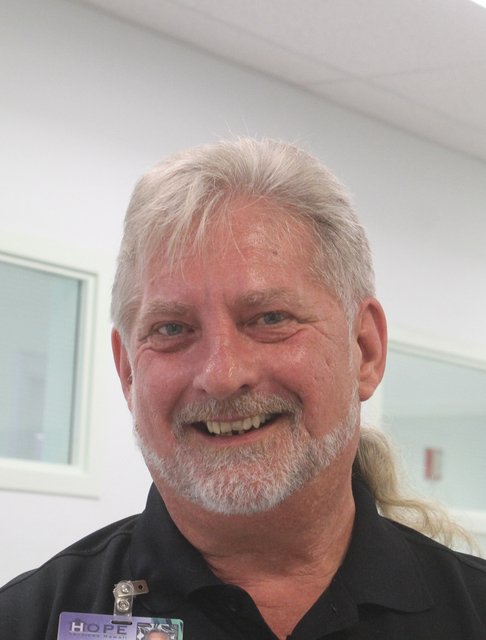What happens after prison? Recently released inmates face a number of challenges as they work to reintegrate with their communities, from getting a new driver’s license to finding the stability they need to stay on a positive track. ADVERTISING What
What happens after prison? Recently released inmates face a number of challenges as they work to reintegrate with their communities, from getting a new driver’s license to finding the stability they need to stay on a positive track.
Hope Services Hawaii is working to make the transition easier.
Last spring, the nonprofit launched a pilot program to help recently released prisoners by partnering them with volunteer mentors. The program focuses on inmates at Hawaii Community Correctional Center (Hale Nani) who are transitioning to extended furlough and are due to be paroled within the year.
“In a nutshell, what mentoring is all about is to help and support,” Hope Services mentor program coordinator Steven “Happy” Stachurski said Thursday morning during an informational session co-hosted by the Hawaii Island Chamber of Commerce.
The pilot program’s stated goal is helping 50 inmates, male and female, with the adjustment process.
Stachurski said he currently has 20 people waiting to be matched with a mentor.
Former inmates receive workforce training while they are on extended furlough. Their top priority, Stachurski said, is finding a new job, which means efforts to focus on fully integrating with the community can fall by the wayside.
The process can be overwhelming.
“The internal pressure they have to get out and get employed supersedes everything,” Stachurski said.
Hope Services’ program provides a support system not geared exclusively toward work.
Mentors are trained to be effective listeners.
They help people learn to manage emotions and develop trust and belief in their own progress.
“You encourage new thinking patterns,” said volunteer Diane Logan, whose husband, Dave, also is a mentor.
“We really want to give back,” Dave Logan said.
Logan’s mentee was in prison for 20 years; when he got out, he had to learn about things such as cellphones.
“It’s all brand new,” Logan said. The role of a mentor is to “encourage and challenge,” he said. It’s a way to remind former inmates that they can still be part of the community.
The value of the mentor program comes from its volunteer nature.
“We’re there because we want to be there,” Stachurski said.
“We as mentors, we need to have compassion, understanding, heart,” said Patrick Kahele, who works with young offenders at Kulani Correctional Facility. Kahele said he himself served a total of 44 years in prison and has been out for the past 9 years.
“What I have to offer is my life experience,” Kahele said. He’s able to remind his mentees that they can still build lives for themselves.
Mentors and mentees meet weekly for at least an hour.
Stachurski spoke of the personal rewards stemming from “being there for somebody.” Because of the weekly meetings, he said, “more and more and more trust develops.”
Mentors themselves receive support from a monthly group meeting.
The program is funded by a two-year grant from the state Department of Public Safety.
“We developed the program from our experience with Second Chance mentoring, which was federal funding,” Stachurski said (the U.S. Department of Justice’s Second Chance grants also support transitional mentoring).
“We know the program works,” he said. “We’re finally at a place where we can take off.”
For more information about the Hope Services mentoring program, contact Stachurski at 443-4717 or sstachurski@hopeserviceshawaii.org.
Email Ivy Ashe at iashe@hawaiitribune-herald.com.



